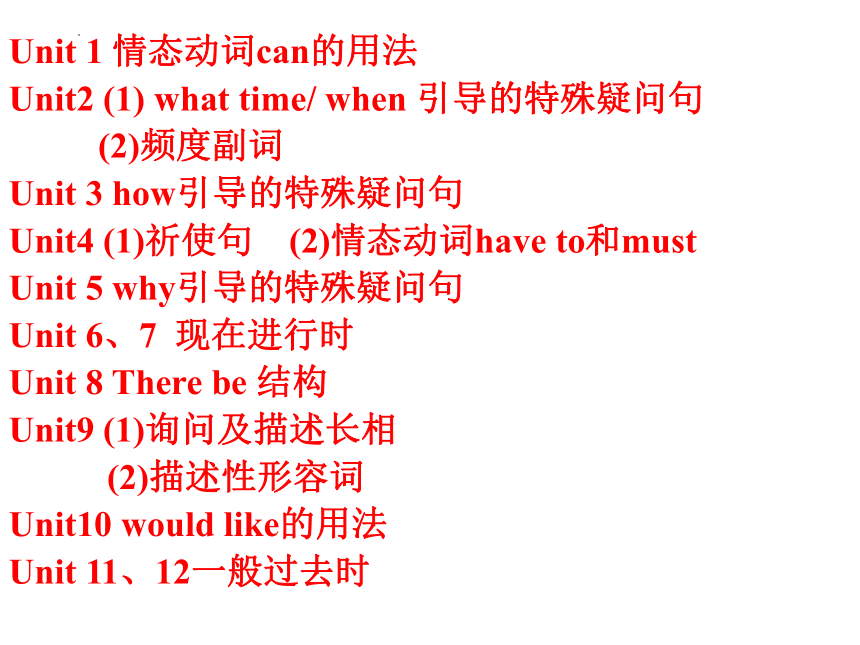(
课件网) Unit 1 情态动词can的用法 Unit2 (1) what time/ when 引导的特殊疑问句 (2)频度副词 Unit 3 how引导的特殊疑问句 Unit4 (1)祈使句 (2)情态动词have to和must Unit 5 why引导的特殊疑问句 Unit 6、7 现在进行时 Unit 8 There be 结构 Unit9 (1)询问及描述长相 (2)描述性形容词 Unit10 would like的用法 Unit 11、12一般过去时 Unit 1 情态动词can的用法 1. 定义 情态动词是动词的一种,表示说话人的语气和情态等,有一定的意义,不能单独作谓语,必须和实义动词或连系动词连用构成谓语。常用的情态动词有can, may,must等。 2. 用法 (1)情态动词can用在陈述句中多表示主语做某事的能力,意为“能,会”;有时也可表示“可能”。 He can answer this question. We can speak English. My brother can be in the bedroom now. (2)含有情态动词can的肯定句变否定句时,需在can后加not,其缩写形式为can’t。 I can sing this song. (肯定句) →I can’t sing this song. (否定句) (3)将情态动词can直接放在句首,构成一般疑问句。 Bob can play the violin. → Can Bob play the violin Yes, he can. No, he can’t. (4)由can引导的一般疑问句可用来表示向对方提出请求或要求给予许可或者询问能力。 ①表示请求 Can you look after my dog ②要求给予许可 Can I play football here ③询问能力 —Can you speak English —Yes, I can. 1. _____ you open the door, please A. Can B. May C. Need D. Would 2. This math problem is too difficult. We ___ do it. may not B. may C. can’t D. can Unit 2 一、 what time/ when 引导的特殊疑问句 1. 教材例句 —What time do you usually take a shower, Rick —I usually take a shower at six forty. —What time does Rick eat breakfast —He eats breakfast at seven o’clock. 2. 用法 what time意为“何时,什么时候”。如果询问主语什么时候做某事,可以用“ What time do/does+主语+动词原形+… ”句型。其中,what time用来提问具体的时间,此时的what time可以用when替换。 What time do you get up =When do you get up What time does she often watch TV =When does she often watch TV 3. 辨析what time 与when what time与when都可以对时间进行提问,表示“什么时候”。 what time用来询问具体的时间点;when可以用来询问具体的时间点,还可以用来询问时间段。 ①对时间状语提问时,有时两者可以互换。 What time/When do you usually go to school ②向对方询问具体时间时,即几点几分,只能用 what time,不能用 when。 What time is it ③询问年份、月份、日期时,只能用when,不能用 what time。 When is the Music Festival 二、频度副词 1. 教材例句 I usually take a shower at six forty. They always get dressed at seven twenty. Anna never eats breakfast. After school, I sometimes play basketball for half an hour. 2. 频度副词的含义 频度副词是副词的一种,通常和一般现在时连用,表示现在经常或反复发生的动作。 本单元出现的频度副词有always, usually, sometimes, never。按照频率发生的高低依次为 always(总是)> usually(通常)>often(经常) sometimes(有时)> hardly(几乎不)>never(从不)。 John always comes late. I usually go to school by bus. He sometimes plays volleyball after school. I never drink milk. 3. 频度副词在句中的位置 (1)频度副词一般位于实义动词之前,系动词be、助动词或情态动词之后,在句中作状语。 We never ... ...

